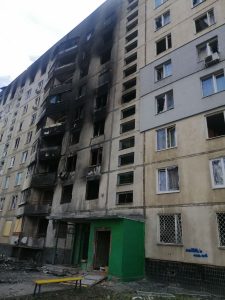Ukraine conflict marks 1000 days
As the Russian invasion of Ukraine reaches the thousand-day mark, a new report has revealed the scale of the humanitarian crisis the conflict has wrought.
The report from the UN’s migration agency IOM says that more than 14.6 million people across Ukraine are in urgent need of humanitarian assistance.
This includes 3.5 million people displaced within the country, many of whom are women, children, elderly and persons with disabilities.
IOM Director Amy Pope said the Russian invasion had left a “a trail of grief and devastation in its wake”.
“As winter arrives, the persistent attacks on Ukraine’s energy infrastructure – decimating 65 per cent of the country’s generation capacity – have left communities struggling without adequate electricity, heating, or water,” she said.
“This is a matter of survival for millions of people and requires the international community to stand together in solidarity.
“I visited Ukraine in April this year and I saw firsthand the devastation the war has wrought and the scale of the challenges ahead.
The IOM report has also revealed the impact of nearly three years of war on the employment, mobility, and labour market dynamics in the country.
According to the report, people who had been recently displaced within Ukraine were more likely to be unemployed (24 per cent), compared to those who had been displaced for one year or more (13 per cent).
“This disparity highlights the challenges of economic integration for newly displaced individuals, who often lack the networks, resources, and stability needed to secure employment in unfamiliar or disrupted environments,” the report said.
“The full-scale invasion has amplified existing inequalities in Ukraine’s labour market, disproportionately impacting internally displaced persons (IDPs), women, and the most vulnerable,” it said.
“This report underscores the importance of targeted support to rebuild livelihoods and empower affected communities to rebuild their futures.”
 The report shows that working age IDPs recorded a higher rate of unemployment (15 per cent, compared to a national average of 11 per cent), as well as a higher proportion of unemployed job seekers (61 per cent) compared to returning migrants and non-displaced individuals.
The report shows that working age IDPs recorded a higher rate of unemployment (15 per cent, compared to a national average of 11 per cent), as well as a higher proportion of unemployed job seekers (61 per cent) compared to returning migrants and non-displaced individuals.
The report also highlights the impact of the full-scale invasion on the wider population of Ukraine.
The employment rate among working-age respondents (18-60 years old) stands at 67 per cent, six percentage points lower than prior to February 2022, despite the massive decline in labour supply in the country due to the forced international migration of more than 6.7 million people.
The most significant challenges faced by job seekers in Ukraine are the lack of local job opportunities and low wages, the report said.
Women, who are more likely to work in the public sector such as education and healthcare, are disproportionately impacted by the low salaries and payment delays prevalent in these sectors.
The report also outlines to the ongoing livelihood needs of millions of Ukrainians despite ongoing efforts.
From January to October 2024, IOM provided nearly 5,000 people with grants for micro-enterprises, vocational training, and livelihoods. So far this year, IOM has provided direct assistance to half a million people.
IOM said it had been collecting data on displacement, needs and vulnerabilities of those affected by the war. In a rapidly evolving context, this data has been crucial in ensuring that aid reaches those who need it most.
“In recent days, attacks have intensified in the country. Since 17 November, dozens of civilians, including children, have been killed as a result of Russian missile strikes on multiple cities on the frontline and beyond. Recent attacks on energy infrastructure have ravaged 65 per cent of Ukraine’s energy generation capacity, severely disrupting electricity, heating, and water supplies across the country, as well as businesses and employment,” IOM said in a statement.
IOM has urged governments, private sector leaders, and individuals around the world to sustain their support for those in greatest need.
“Together we can ensure that even in the darkest of winters, there is warmth, dignity, and the promise of a peaceful future,” Ms Pope said.












